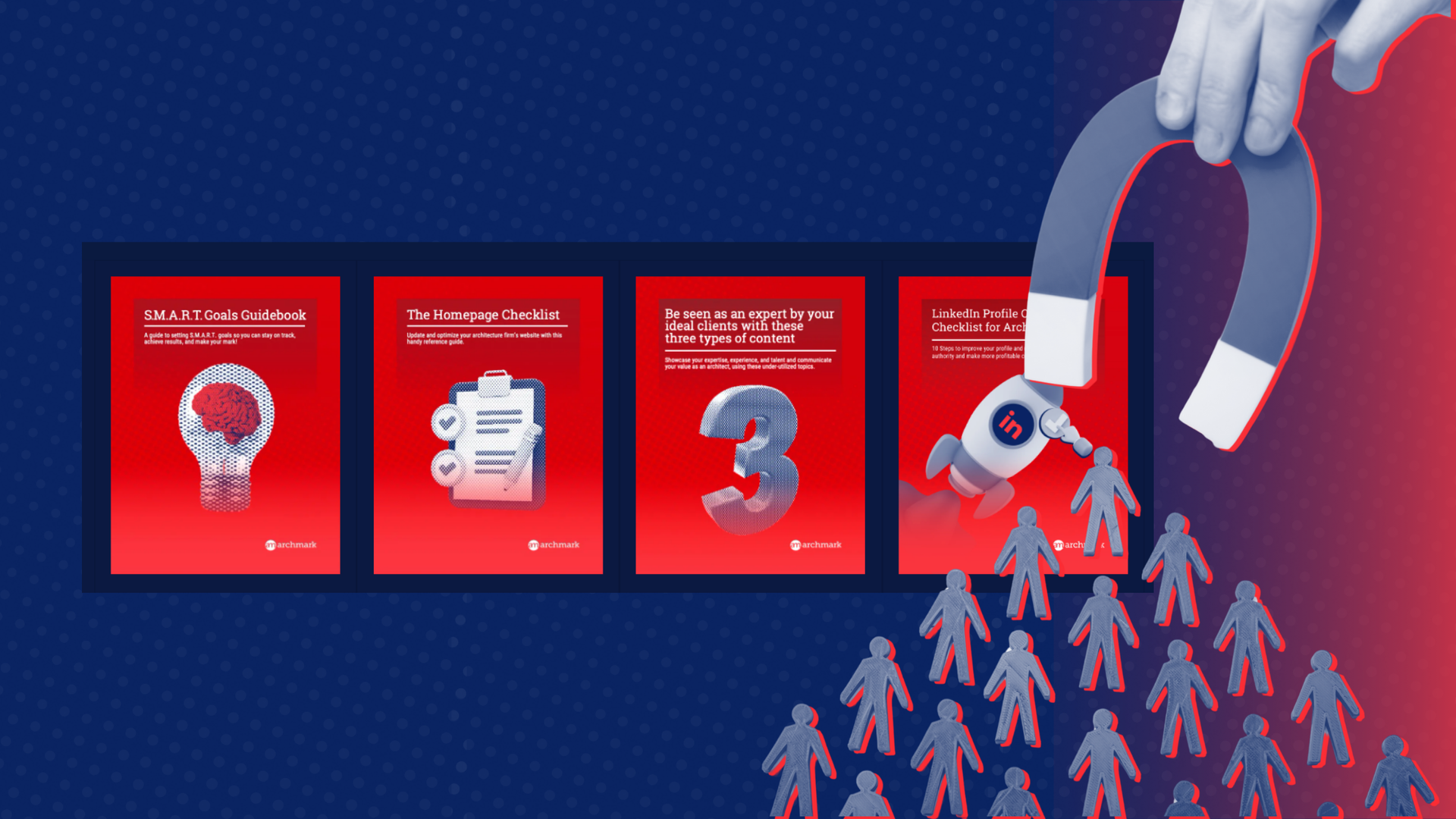Six Architect Business Development Strategies to Grow Your Firm
Architect Business Development Strategies to Find Better Clients & Projects For Your Firm
Take Control of your Business Development Pipeline
Architect business development can be very challenging. It's not a topic that comes up in design school, and many of the practices that firms employ today can simply be categorized under the heading, “That's the way we've always done things.”
At Archmark, we've helped more than 2,000 architects, in speaking with many firm owners, we've come to understand the struggles of running a successful architecture and design firm.
For example you may be struggling with one of more of the following issues:
- Taking on “bad fit” projects because you have to pay the bills
- Struggling to find new clients because you don't have a marketing system
- Feeling pressure to reduce your fees because clients don't understand or value what you do
- Getting pigeon-holed into the same type or level of projects due to a limited referral network
- Anxiety about your future due to relying on a small number of large project sources
If you’re looking to grow your architecture firm and take it to the next level, it may be time to consider some new ideas to mix into your business development process.
So, what do you do? Where do you start?
First, you have to be clear about what you want. You may want more clients, better clients, more projects, "dream" projects, or possibly more staff or office upgrades to help handle new business. If you are not clear about what you want, this would be a good time to read our article about setting S.M.A.R.T. Goals for your firm.
If you are clear about what you want, you may not be sure how to get there, and we get that. It can be overwhelming to juggle business development and marketing efforts along with managing your current clients' projects and your daily business operations. Read our article to learn more about How You Can Get More Projects Online.
A few years ago, we were doing that same juggling act ourselves as we were trying to run and grow our agency at the same time. It was a daily challenge to keep all the balls in the air. Luckily, very few crashed to the ground, repairs were quick, and we learned some valuable lessons, so keep reading to learn from our experiences.
Start by Stopping the Juggling, and Getting Focused.
Most of all, we knew we had to get out of the juggling routine and find a better way to manage operations and business development at the same time. We needed to fix project processes, rebuild client relationships, and reconnect with prospects.
We tried a few different approaches and tactics. It didn't take long to see what worked for our personalities and way of working, and what worked to give us the business results we wanted.
Over time, we discovered six business development strategies that gave us immediate and lasting results. As we saw these strategies work for our business, we started to incorporate them into our clients' projects, with similarly positive results.
Keep reading to learn how you can use our architect firm business development strategy six-pack to keep your firm thriving!
1. Work Backwards To Attract Ideal Clients & Better Projects
Do you you have a clear idea of who your ideal client is, or what a dream project looks like for your architecture firm?
If you can clearly define the best projects for your firm, it's much easier to work backwards to understand who can help you get those projects. And once you know who they are, it's easier to trace where they are most likely to “hang out” or where they get their information.

Many great projects start with a personal connection, but it's important to build connections with the right people, and to do that in an efficient and strategic way. Focus your networking efforts where your dream clients, or their influencers, hang out — whether in person and/or online.
Work your network! Be sure to also let your existing clients know what projects you want.
Everyone you know is a potential client, connection point, or lead. Chances are good that someone you already know can lead you to your dream project. It's all about figuring out who those people are, and ensuring that they understand your goals.
ACTION STEP: Update your LinkedIn profile to make it clear what types of projects and clients you want for your firm. Bonus points for featuring a project that is a great example of your dream project. If you're not on
LinkedIn, get started now!

2. Build Authority & Influence By Sharing Your Expertise
Would you like to be the “go-to” architect that your ideal future clients think of most often when they need someone with your expertise, experience, and talents?
Of course you would, it's a no-brainer, we all want to be appreciated, valued, and sought-out for our skills and talents.
However, many architects focus their attention on speaking at conferences and writing white papers that are intended solely for their industry colleagues. While there is nothing wrong with this, it's a missed opportunity if you are not sharing your expertise with your ideal future clients to build your recognition, reputation, and relationships.
Many architects scoff at HGTV shows like “Fixer Upper” or “Property Brothers.” Often, such programs gloss over the realities of home design, remodeling, and renovation. However, there is no question that the home design industry has taken off since 1994, as a result of these shows making home decor and design more accessible for DIYers, and easier to navigate for those wanting to hire professional designers.
Many architects complain that prospects do not understand what they do, or the value they provide. Perhaps, if more architects were sharing ideas, information and insights with the public, this would change.
The good news is that there are proven and easy ways to get the word out and reach your ideal audiences. Below are three methods we recommend.
Speak at local events
We know public speaking ranks at the top of the stress list for many people. Not that long ago, we felt exactly the same way. In fact, we started small, hosting workshop-style events for small groups so we could keep it conversational. Then we participated in panel discussions and presentations with local business and networking groups. Now we are frequently asked to speak to organizations large and small.
Seek out some opportunities to speak at local business networking events, service organizations, industry seminars. Get creative and keep looking for ways to get in front of the right people. The topics you speak on don’t have to be directly related to architecture. One of our most successful speaking engagements was with a panel of working couples, sharing our stories and taking questions about working with a spouse.
If the idea of speaking still scares you, find a way to start small — volunteer to introduce the speakers at the next AIA event or host a panel discussion and Q&A session for a local homeowner's association. The more you flex your “public speaking” skills, the easier it becomes, and the better you get.


Write informative articles for your blog
Writing is almost the opposite of standing up in front of a crowd to speak. But it can still be just as challenging, and, possibly, intimidating.
The key to consistent quality writing is having a plan and knowing what you want to write about before sitting down to write.
It's also important to think about where your content should appear.
Your ideal clients likely turn to a variety of influencers, publications, or websites to get ideas and inspirations for their projects. The best way to learn what sways them and their decision making is to ask. Ask them to name their favorite design-related websites, Youtube channels, magazines, writers, podcasters, and more.
Exploring these sources may give you great ideas on what you could write about, and contacting them to learn about article submissions is a great way to get in front of new audiences.
Another source of inspiration, and one that works very well for Search Engine Optimization (SEO) purposes, is to list the common questions that clients ask at the early stages of a project.
You could also brainstorm ideas based on what you wish they knew about the process, or topics they rarely think about which can really help them. Of course, you can always write about trends and share your educated opinion on architecture and design.
In writing content, it is sometimes easier to stand out by sharing a position that may be different, or even provocative. But be careful to back up your position with well researched reasons, and be authentic. It's important that anything you share also reflects your unique approach and style.
By the way, after evaluating more than 550 architecture firm websites, we've discovered three essential content marketing topics for architects.
Like speaking, it's easy to start small by writing articles. We have found blogging gives our clients a chance to develop a writing style and get comfortable with sharing their ideas and opinions.
Keep in mind that the content you share should be informative and helpful, this isn't about making a sales pitch.
ACTION STEPS: Follow these simple steps to get started writing or speaking:
- Brainstorm three ideas for a presentation or series of articles you'd like to share.
- IDEA - Start by sending an email to past clients asking them what questions they wish they had asked prior to hiring you.
- Identify at least three possible organizations/publications and reach out to them to pitch your ideas.
- HOT TIP - Local business magazines and newspapers, local chambers and service organizations are often happy to have an experts offer to provide content or speak on topics that connect or help their audiences/members.
- Once your idea is accepted, get cracking with outlining and writing your content.

Guest appearances on podcasts
Another effective way to get the word out about your expertise, experience, and talents are guest appearances on podcasts.
While getting interviewed may sound challenging at first glance, it's often not as difficult as it seems. Many podcast hosts are happy to feature knowledgeable guests, especially if they are able to share information and insights that their listening audience will appreciate.
One way to approach it is to take the perspective that most podcast hosts probably won't offer you opportunity to be featured on their podcast, if you do not reach out first and express interest by asking first.
The key is to find podcasts that your ideal future clients already listen to.
Perhaps a local builder or designer has a podcast that speaks directly to your target audience? Maybe you watch a Youtube channel regularly and find yourself thinking, “I bet my clients would enjoy that.”
Of course, you can always ask your clients as well.
ACTION ITEM - If you want to get on a podcast, a simple way to reach out is to send an email asking a simple question, “How does someone get invited to your show?“ This simple question is an easy way to open a dialogue to find out more about the show’s process. You do need to be prepared to respond with some ideas about what you would want to talk about, and it can't hurt to make sure your Linkedin and online profiles up to date, but often, reaching out casually and starting a simple conversation is the best way to get started.
3. Craft An Architecture Portfolio that Matches Your Goals
Over the course of our careers, we've had many great clients and projects across a wide-range of industries. How did we choose to focus on architecture? Aside from being self-proclaimed “Archi-Geeks” ourselves, it really came down to asking a simple question: "Which clients or projects would we jump at the chance to do again and again?"
When it comes to your portfolio, this is the questions that matters more thank anyting else.

Your portfolio should reflect the work that you want to do most. Whether your favorite project was high-end retail or a university student center, lead off with the best of your best to draw the attention of prospective clients who fit your focus and can bring more of those kinds of projects to you. You don't have to show off everything you've ever done. Be selective and err on the side of “less is more.”
ACTION STEP: Take a critical look at your current portfolio and remove any projects that don't reflect the type of work you want to attract. Feature the best projects by adding more detail. (Always use professional photography. Always.) You can also read our
Architecture Portfolio Tips
article for more ideas.
4. Grow & Nurture Your Referral Network
No matter what type of architect you are, referrals are likely your biggest source of new projects. Like many professional service businesses, architecture is a relationship-based business.
But there are serious risks in relying solely on referrals. Your referrals sources can dry-up without warning due to career changes and other unforeseen events. Referrals by their very nature are also unpredictable, you can never be sure when the next referral is coming.
Often, however, the problem with referrals isn't the referral sources, it's actually our own complacency with maintaining strong relationships with our referral sources that is the problem.
Referrals can come from an enthusiastic employee, a happy client, or the general contractor who loved working with you on a successful project. But to make best use of our referral sources, we need to keep them informed and up-to-date on what we are working on, the types of referrals we are looking for, and to build good will with them so we are top of mind for them the next time an opportunity to refer us comes around.
It just goes to reason that the more they understand about you, your firm and what you are looking for, the better they can connect you to future opportunities.
Of course, this doesn't have to rest solely on your shoulders. Your team can also help you to keep contact with referral sources, and they can develop sources of their own
ACTION STEP: Clarity is the key! Make sure everyone on your team can answer the question "What do you do?" with an engaging and interesting response that goes beyond "We’re an architecture firm." The easier it is for you and your team to explain what you do or how your firm works, the better. Do some brainstorming with your team to come up with creative ways to explain what your architecture firm does.
5. Make Your Brand Your “Unfair Advantage”
In architecture firm marketing, your “Unfair Advantage” is something your firm has that your competitors don't and which they can't easily recreate or substitute.
When we work with architects, we always start with our BrandBuild™ Workshop. This workshop is specifically designed to bring clarity to your firm's story. Just like a fingerprint, your story is unique to you and your firm, and it's a great place to start when thinking about how you stand out from the crowd.
When we talk about a brand, we are not talking about a logo, we are talking about how your clients, prospects, partners, employees, and anyone who comes in contact with your firm feels or perceives your firm. What is their perception, what is ther gut feeling about you and your firm.
Just to be clear, because it's a perception, you can't own your brand, you can only influence it, and the process of inflluencing brand perception, is called branding.
There are four components to a good brand, what we refer to as the Four Ps:
- PURPOSE - the why behind what you do and what motivates you.
- PROMISE - the experience you create, how you want clients to feel about working with you.
- POSITION - your secret sauce, what you do better than others, what makes your firm unique.
- PERSONALITY - Your
brand's archetype is key to how your firm connects with others on a more emotional level.
The more clear you can be about your brand and these Four Ps, the more of a unfair advantage you'll have.
Everything the world sees about your firm should reflect your brand, i.e. the perception you are trying to create, everything should be consistent — from the visual (logo, business cards, website, portfolio, signage) to the messaging and vocabulary you use on your website and collateral materials, and every other facet of your firm — should be engaging reminders of your brand.
ACTION STEP: Get consistent with your use of branding. Architecture is visual and experiential, especially in the eyes of your clients. Make sure your visual identity is clear and consistent. Add email signatures with your logo. Update all your social and networking profiles to use the same logo and business description, and have everyone on your team do the same. Consider how you can incorporate a specific style of project images that ties to your brand.
6. Email for the (Follow-up) Win!
Persistence and Patience are the dynamic duo of business development.
One of the most important strategies for success in marketing is the follow-up. Yet it's one that most people will admit they don't do well.
Once you've exchanged business cards with a few new contacts, follow up with an email and connect on LinkedIn. If you use a Client Relationship Management (CRM) tool, add their info to the appropriate group — warm prospect, influencer, collaborator, referral, etc. Stay up to date with regular, helpful emails to keep those contacts fresh.

You can also create an opt-in email news list using a service such as our favorite, ActiveCampaign. Ask your contacts if they want to be part of the mailing list, and use it to keep them engaged. That makes it easier to automate follow up emails on a timely basis. Emails can feature updates about your latest projects, your design philosophies, trends, and behind-the-scenes looks at the firm.
Sometimes nothing beats the old-fashioned phone call or even meeting for a coffee or drink to catch up. Don't overlook the value of having face time with the best prospects!
Help Your Architecture Business Reach Full Potential
These are just a handful of business development strategies that can help your architecture firm make its mark, no matter what stage you are at today.
Don't worry about doing it all! Start with the ideas that you can most easily adapt and put to use.
Marketing your architecture firm shouldn't be overwhelming — you don't have to do it alone. Get your team involved and look to outside consultants for a fresh perspective, focus, and up-to-date knowledge. Find a marketing partner who can work with you on strategy, fuel your business development, and take help get things off your to-do list.
Learn more about Strategic Email Marketing for Architects.
Archmark can help you build up your business, so you can focus on leading your firm.
Archmark works with architects to help them gain RECOGNITION and awareness through a strong and engaging online presence, build and establish their REPUTATION as an authority in their key areas of practices, and grow and nurture important RELATIONSHIPS to help them find, attract, and connect with ideal future clients and better projects.
We focus on how to build up your business, so you can focus on leading your firm. If you are ready to improve your firm's marketing, why not apply below for a free, no obligation Clarity Call to dig into the opportunities and gaps that your firm may be struggling with. We'll discuss how to optimize your prospect pipeline, so you no longer have to wonder when the next referral is going to call.
Click below to get started to get started with a free Clarity Call.












